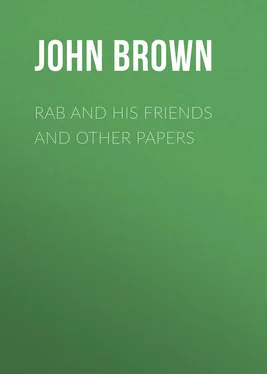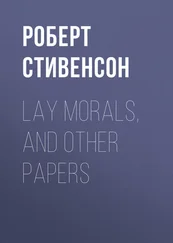John Brown - Rab and His Friends and Other Papers
Здесь есть возможность читать онлайн «John Brown - Rab and His Friends and Other Papers» — ознакомительный отрывок электронной книги совершенно бесплатно, а после прочтения отрывка купить полную версию. В некоторых случаях можно слушать аудио, скачать через торрент в формате fb2 и присутствует краткое содержание. Жанр: foreign_antique, foreign_prose, на английском языке. Описание произведения, (предисловие) а так же отзывы посетителей доступны на портале библиотеки ЛибКат.
- Название:Rab and His Friends and Other Papers
- Автор:
- Жанр:
- Год:неизвестен
- ISBN:нет данных
- Рейтинг книги:5 / 5. Голосов: 1
-
Избранное:Добавить в избранное
- Отзывы:
-
Ваша оценка:
- 100
- 1
- 2
- 3
- 4
- 5
Rab and His Friends and Other Papers: краткое содержание, описание и аннотация
Предлагаем к чтению аннотацию, описание, краткое содержание или предисловие (зависит от того, что написал сам автор книги «Rab and His Friends and Other Papers»). Если вы не нашли необходимую информацию о книге — напишите в комментариях, мы постараемся отыскать её.
Rab and His Friends and Other Papers — читать онлайн ознакомительный отрывок
Ниже представлен текст книги, разбитый по страницам. Система сохранения места последней прочитанной страницы, позволяет с удобством читать онлайн бесплатно книгу «Rab and His Friends and Other Papers», без необходимости каждый раз заново искать на чём Вы остановились. Поставьте закладку, и сможете в любой момент перейти на страницу, на которой закончили чтение.
Интервал:
Закладка:
Rab had the dignity and simplicity of great size; and having fought his way all along the road to absolute supremacy, he was as mighty in his own line as Julius Cæsar or the Duke of Wellington, and had the gravity 3 3 A Highland game-keeper, when asked why a certain terrier, of singular pluck, was so much more solemn than, the other dogs, said, "Oh, Sir, life's full o' sariousness to him – he just never can get eneuch o' fechtin'."
of all great fighters.
You must have often observed the likeness of certain men to certain animals, and of certain dogs to men. Now, I never looked at Rab without thinking of the great Baptist preacher, Andrew Fuller. 4 4 Fuller was, in early life, when a farmer lad at Soham, famous as a boxer; not quarrelsome, but not without "the stern delight" a man of strength and courage feels in their exercise. Dr. Charles Stewart of Dunearn, whose rare gifts and graces as a physician, a divine, a scholar, and a gentleman, live, only in the memory of those few who knew and survive him, liked to tell how Mr. Fuller used to say, that when he was in the pulpit, and saw a buirdly man come along the passage, he would instinctively draw himself up, measure his imaginary antagonist, and forecast how he would deal with him, his hands meanwhile condensing into fists, and tending to "square." He must have been a hard hitter if he boxed as he preached – what "The Fancy" would call "an ugly customer."
The same large, heavy, menacing, combative, sombre, honest countenance, the same deep, inevitable eye, the same look, as of thunder asleep, but ready, – neither a dog nor a man to be trifled with.
Next day, my master, the surgeon, examined Ailie. There was no doubt it must kill her, and soon. It could be removed – it might never return – it would give her speedy relief – she should have it done. She curtsied, looked at James, and said, "When?"
"To-morrow," said the kind surgeon – a man of few words. She and James and Rab and I retired. I noticed that he and she spoke little, but seemed to anticipate everything in each other. The following day, at noon, the students came in, hurrying up the great stair. At the first landing-place, on a small well-known black-board, was a bit of paper fastened by wafers, and many remains of old wafers beside it. On the paper were the words, – "An operation to-day. – J. B. Clerk ."
Up ran the youths, eager to secure good places: in they crowded, full of interest and talk. "What's the case?"
"Which side is it?".
Don't think them heartless; they are neither better nor worse than you or I: they get over their professional horrors, and into their proper work; and in them pity, as an emotion , ending in itself or at best in tears and a long-drawn breath, lessens, – while pity, as a motive , is quickened, and gains power and purpose. It is well for poor human nature that it is so.
The operating theatre is crowded; much talk and fun, and all the cordiality and stir of youth. The surgeon with his staff of assistants is there. In comes Ailie: one look at her quiets and abates the eager students. That beautiful old woman is too much for them; they sit down, and are dumb, and gaze at her. These rough boys feel the power of her presence. She walks in quickly, but without haste; dressed in her mutch, her neckerchief, her white dimity short-gown, her black bombazeen petticoat, showing her white worsted stockings and her carpet shoes. Behind her was James with Rab. James sat down in the distance, and took that huge and noble head between his knees. Rab looked perplexed and dangerous; for ever cocking his ear and dropping it as fast.
Ailie stepped up on a seat, and laid herself on the table, as her friend the surgeon told her; arranged herself, gave a rapid look at James, shut her eyes, rested herself on me, and took my hand. The operation was at once begun; it was necessarily slow; and chloroform – one of God's best gifts to his suffering children – was then unknown. The surgeon did his work. The pale face showed its pain, but was still and silent. Rab's soul was working within him; he saw that something strange was going on, – blood flowing from his mistress, and she suffering; his ragged ear was up, and importunate; he growled and gave now and then a sharp impatient yelp; he would have liked to have done something to that man. But James had him firm, and gave him a glower from time to time, and an intimation of a possible kick; – all the better for James, it kept his eye and his mind off Ailie.
It is over; she is dressed, steps gently and decently down from the table, looks for James; then turning to the surgeon and the students, she curtsies, – and in a low, clear voice, begs their pardon if she has behaved ill. The students – all of us – wept like children; the surgeon happed her up carefully, – and, resting on James and me, Ailie went to her room, Rab following. We put her to bed. James took off his heavy shoes, crammed with tackets, heel-capt and toe-capt, and put them carefully under the table, saying, "Maister John, I'm for nane o' yer strynge nurse bodies for Ailie. I'll be her nurse, and I'll gang aboot on my stockin' soles as canny as pussy." And so he did; and handy and clever, and swift and tender as any woman, was that horny-handed, snell, peremptory little man. Everything she got he gave her: he seldom slept; and often I saw his small shrewd eyes out of the darkness, fixed on her. As before, they spoke little.
Rab behaved well, never moving, showing us how meek and gentle he could be, and occasionally, in his sleep, letting us know that he was demolishing some adversary. He took a walk with me every day, generally to the Candlemaker Row; but he was sombre and mild; declined doing battle, though some fit cases offered, and indeed submitted to sundry indignities; and was always very ready to turn, and came faster back, and trotted up the stair with much lightness, and went straight to that door.
Jess, the mare, had been sent, with her weather-worn cart, to Howgate, and had doubtless her own dim and placid meditations and confusions, on the absence of her master and Rab, and her unnatural freedom from the road and her cart.
For some days Ailie did well. The wound healed by the first intention for as James said, "Oor Ailie's skin's ower clean to beil." The students came in quiet and anxious, and surrounded her bed. She said she liked to see their young, honest faces. The surgeon dressed her, and spoke to her in his own short kind way, pitying her through his eyes, Rab and James outside the circle, – Rab being now reconciled, and even cordial, and having made up his mind that as yet nobody required worrying, but, as you may suppose, semper paratus .
So far well: but, four days after the operation, my patient had a sudden and long shivering, a "groosin'," as she called it. I saw her soon after; her eyes were too bright, her cheek coloured; she was restless, and ashamed of being so; the balance was lost; mischief had begun. On looking at the wound, a blush of red told the secret; her pulse was rapid, her breathing anxious and quick, she wasn't herself, as she said, and was vexed at her restlessness. We tried what we could. James did everything, was everywhere; never in the way, never out of it; Rab subsided under the table into a dark place, and was motionless, all but his eye, which followed every one. Ailie got worse; began to wander in her mind, gently; was more demonstrative in her ways to James, rapid in her questions, and sharp at times. He was vexed, and said, "She was never that way afore, no, never." For a time she knew her head was wrong, and was always asking our pardon – the dear gentle old woman: then delirium set in strong, without pause. Her brain gave way, and then came that terrible spectacle, she sang bits of old songs and Psalms, stopping suddenly, mingling the Psalms of David, and the diviner words of his Son and Lord, with homely odds and ends and scraps of ballads.
Читать дальшеИнтервал:
Закладка:
Похожие книги на «Rab and His Friends and Other Papers»
Представляем Вашему вниманию похожие книги на «Rab and His Friends and Other Papers» списком для выбора. Мы отобрали схожую по названию и смыслу литературу в надежде предоставить читателям больше вариантов отыскать новые, интересные, ещё непрочитанные произведения.
Обсуждение, отзывы о книге «Rab and His Friends and Other Papers» и просто собственные мнения читателей. Оставьте ваши комментарии, напишите, что Вы думаете о произведении, его смысле или главных героях. Укажите что конкретно понравилось, а что нет, и почему Вы так считаете.












